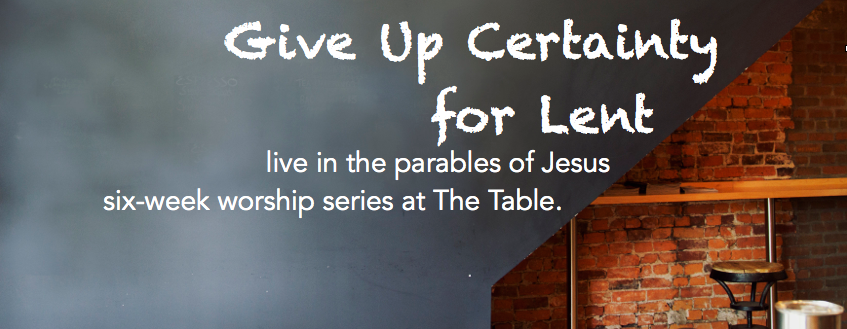We are inviting our community to Give Up Certainty for Lent as we root ourselves in the parables of Jesus. We move into our third week and the Parable of The Wise & Foolish Bridesmaids.
What is a parable? Exact definitions vary from “stories of life with religious or spiritual lessons” to “metaphors or similes that take narrative form.” We will be operating on an understanding of parables as “thin places” where the usual boundaries between heaven and earth, holy and ordinary, known and mysterious, come together. (From Kingdom, Grace, Judgment. Paradox, Outrage, and Vindication in the Parables of Jesus by Robert Farrar Capon, page 1).
The parables of Jesus take everyday experiences from the time of Jesus and turn them upside down. By showing us ordinary elements and experiences, parables provide a transparency to see the whole of our live and the holy in our lives in a new way (from John Indermark, Parables and Passion, Jesus’ stories for the days of Lent, page 11).
Outline of our Lenten Series
March 9 Matthew 13.33/Luke 13.20-21 Parable of The Leaven & The Mustard Seed
March 16 Matthew 13.24-30 Parable of The Weeds
March 23 Matthew 25.1-13 Parable of The Wise & Foolish Bridesmaids
March 30 Matthew 20.1-16 Parable of The Laborers in the Vineyard
April 6 Agape (David Scherer)
April 13 (Palm Sunday)Luke 15.11-32 Parable of The Prodigal Son
April 17 (Maundy Thursday Matthew 22.1-14 Parable of The Wedding Banquet
April 18 (Good Friday) Matthew 21.33-46 Parable of The Wicked Tenants
April 20 (Celebrate Easter) at 6:30 am Rose Garden McKinley Park & 10:30 am Sanctuary
Read the Parable of The Wise & Foolish Bridesmaids for this week.
“Jesus’ wedding parable in this week’s gospel reading describes a situation where things don’t go quite according to plan. We don’t know a great deal about all the particulars involved in a first century Jewish wedding. But like twenty-first century weddings, things never run right on schedule. Delays and minor “disasters” are the norm, it seems, across the centuries….
Jesus describes what should be a joyous event, a wedding celebration. The only active participants in Jesus’ telling, however, are the bridegroom and ten “parthenos,” a term translated sometimes as “virgins” (Matthew 1:23) but in this “wedding” context translators have colloquially rendered it as “bridesmaids.” Apparently the role of these ten attendants was to light the processional from the bride’s father’s house as the new couple made their way to the bridegroom’s home. The bridal negotiations, which agreed upon a bride price, took place first. The celebratory feast, the joyous wedding banquet, took place only after the bridal party arrived at the new couple’s home.
A “lampades” literally described a “candle protected by a shade.” Since the sticking point of this whole parable rests upon the lack of “oil,” these “lamps” must be oil burning lamps, or perhaps, given their intended processional purpose, an oil-soaked torch. The “wise” or “sensible” young women bring refills for their lamps. The “foolish” ones do not. Even though there is no stated reason to expect the need for additional oil supplies, half of these “bridesmaids” look firmly enough towards the coming celebration to make absolutely sure that nothing will keep them from attending. (by Leonard Sweet, commentary on Matt 25.1-13)
Consider these questions: How has God’s Grace caught you unprepared? How has God’s choice for you or for another caught you unprepared?
For example: Have you or someone you are close to ever had a well thought out plan only to find that God had another direction in store for you? What was that like?


0 Comments